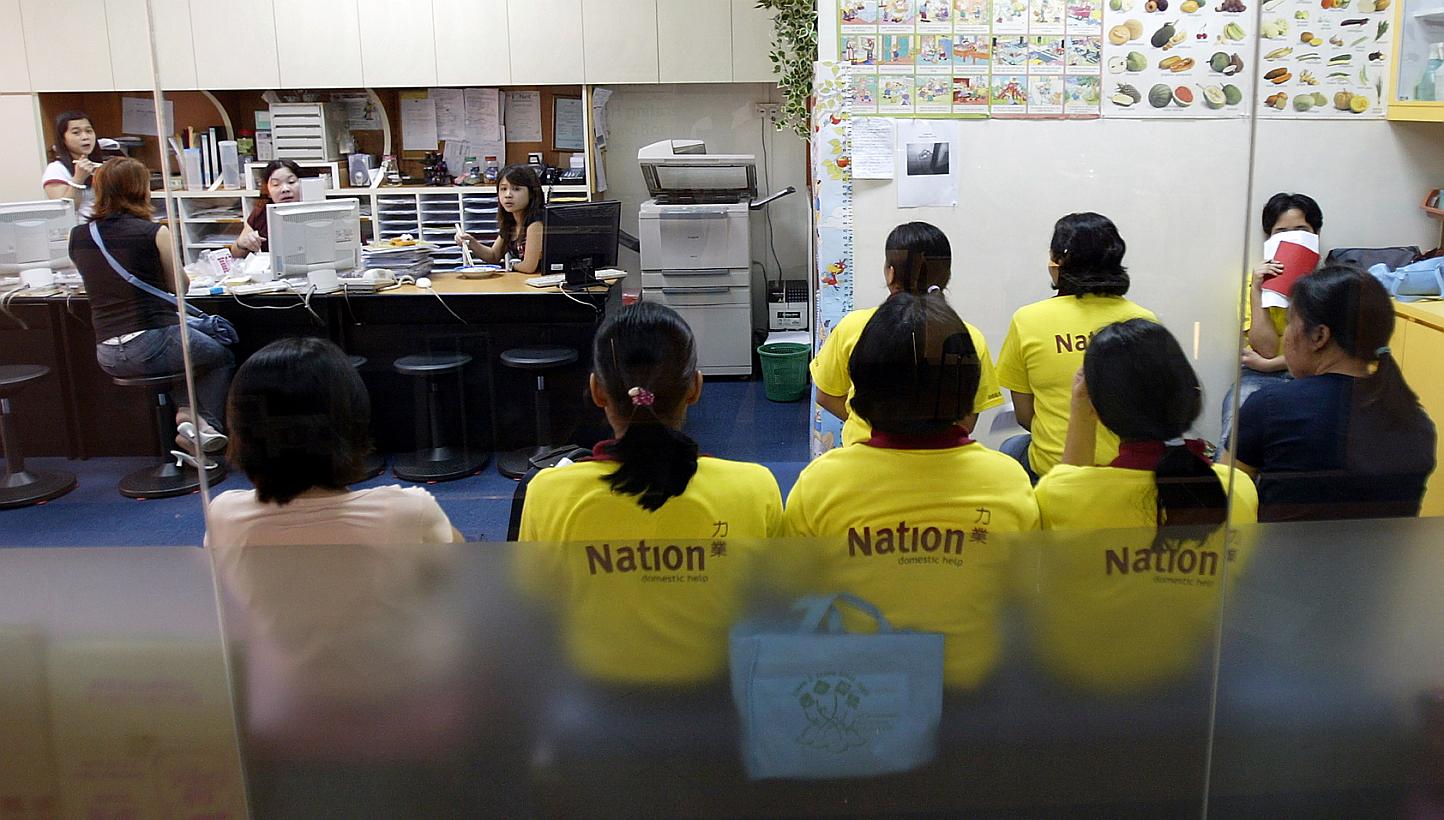S.E.A. VIEW
Indonesia's dilemma over foreign domestic workers
Sign up now: Get ST's newsletters delivered to your inbox

Maids at a maid agency in Hougang Green mall. -- PHOTO: ST FILE
During a recent visit to Malaysia, Indonesian President Joko Widodo expressed shame when discussing the issue of Indonesian women working overseas as foreign domestic workers (FDWs).
In an effort to preserve the dignity of the nation, the President announced plans to stop sending women to work as domestic helpers overseas. In doing so, he failed to realise the greater consequences of legitimate employment opportunities for women being cut.
The growing gender challenges of development and economic growth aside, women also face numerous cultural hurdles in establishing economic security.
There is a need for more income-generating opportunities to be provided for women in order for them to live stable, secure and, indeed, dignified lives.
Instead of "band-aid" solutions, policies should be aimed at greater regulation and protection of FDWs. It is, in fact, by empowering its women that Indonesia will find greater dignity.
Jobs equal dignity
THERE is ample evidence from cases in Asia and elsewhere that higher female incomes most often go towards the betterment of the family.
This includes increased household food security and greater spending on education and healthcare. For these women, financial independence puts food on the table, sends their children to school and takes care of their families' health and welfare.
Higher incomes for women can also help to narrow the gaps in resource distribution between genders, which can have a positive impact on the community as well.
However, given prevalent gender inequity, income disparities between men and women remain high. This creates a culture of dependence for women.
Women who are economically insecure often encounter many obstacles. Many women tolerate years of physical and psychological abuse because they do not have the financial means to make a life for themselves.
Increasing levels of economic security for women should be a key concern for government, given the various setbacks that arise as a result of their financial dependence.
Being engaged in gainful employment enables poor and dependent women to negotiate for the lives they wish to lead. It gives them a legitimate "space" to freely leave the home and return without compromising their roles as daughters, sisters, wives and mothers.
In the eyes of many conservative families, looking after children or a home or the elderly is a "decent" job through which their womenfolk are permitted to enter the workforce.
Many women, with their limited education and skills, find the skill set for domestic work within their capabilities.
Indonesia does not want to be seen as a net exporter of its people. However, it is high time leaders realised that FDWs provide a valuable service in receiving countries.
Politically speaking, such a move to curb FDWs may assuage the middle and upper classes who do not want the country to be seen as "lowly", but it does little to alleviate the plight of women who see being FDWs as a chance to get out of the cycle of poverty.
Indonesia is one of the top three countries in the world supplying domestic workers. For the poor and disenfranchised Indonesian women, domestic work is a job that empowers them financially.
In spite of having to face uncertainties in receiving countries, being away from all that is familiar and facing the possibility of ill treatment, women still leave to work overseas.
The industry is thriving and, until other employment opportunities for these women open up, it will continue to flourish.
Regulate, not ban
INDONESIA has a large population of FDWs in the Asean region and beyond.
These women contribute significantly through their remittances to their country's economy, with almost all their pay sent home to families.
Stopping this will just push them into more fraught ways of earning an income. It will also make them more vulnerable to being trafficked.
Migrant worker numbers in Asean countries are growing. Thus, greater regulation and monitoring seem to be the order of the day.
FDWs need to be made more aware of their rights, and there should be help centres and agencies set up to make sure that there is easy access to assistance if needed, including easy communication with their families back home.
The provision of such assistance needs to be decentralised and located at village levels and in small townships across the country.
Expanding the geography of receiving countries for a job that is in demand can also play a part in protecting these women. Countries with stronger labour laws that protect the rights of the worker and with good diplomatic ties with Indonesia should be seen as potential receiving countries.
The creation of jobs domestically to absorb additional numbers of unskilled females may seem a good idea, but the total number of this group will increase if they are no longer allowed to travel out of the country to work.
Moreover, the Indonesian Manpower Minister's claim to send only "well-equipped and skilled workers abroad" will already exclude a large number of women.
As part of the wider objective of building an Asean community that is centred on its people, a better option for Indonesia would be to raise its game in empowering women through greater access to education and safeguarding their rights and interests.
Skills training, increased literacy and political participation, as well as equal opportunities, should be available to women and should be part of the plan to maintain Indonesia's development trajectory and its dignity as an influential entity in the region.
The writer is a research fellow at the Centre for Non-Traditional Security Studies at the S. Rajaratnam School of International Studies (RSIS), Nanyang Technological University in Singapore.
This article first appeared in RSIS Commentary.
S.E.A. View is a weekly column on South-east Asian affairs


